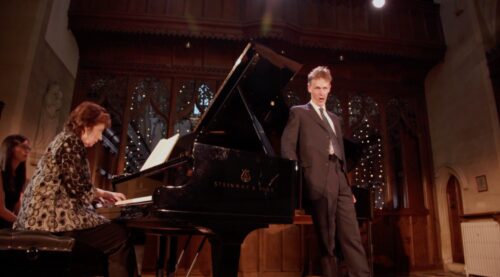
 United Kingdom Oxford Lieder Festival 2021 [1] – Beethoven, Robert Schumann, Felix & Fanny Mendelsohn, & Clara Schumann: Siân Dicker (soprano), Ian Bostridge (tenor), Krystal Tunnicliffe and Imogen Cooper (piano). St John the Evangelist Church, Oxford 11.10.2021 (CR)
United Kingdom Oxford Lieder Festival 2021 [1] – Beethoven, Robert Schumann, Felix & Fanny Mendelsohn, & Clara Schumann: Siân Dicker (soprano), Ian Bostridge (tenor), Krystal Tunnicliffe and Imogen Cooper (piano). St John the Evangelist Church, Oxford 11.10.2021 (CR)

Felix Mendelssohn – Neue Liebe, Op.19a No.4; Schilflied
Fanny Mendelssohn – Italien
Clara Schumann – ‘Liebst du um Schönheit’ Op.37 No.4; Lorelei
Beethoven – An die ferne Geliebte, Op.98
Robert Schumann – Liederkreis, Op.39
Each of this year’s Oxford Lieder Festival’s principal evening recitals consists of a shorter than usual programme, without an interval, but prefaced with a quarter of an hour or so of songs by emerging artists, before more established performers take the limelight for the remaining hour. The overall theme for this year’s series is ‘Nature’s Songbook’, but in this recital, love – the equally prevalent subject of song settings throughout the ages, in its joys, frustrations, and unattainability – came to the fore, albeit often set against the suggestive backdrop of nature.
Siân Dicker gave a robust opening to this performance with her powerfully projected accounts of a clutch of settings from the early Romantic era. If her breathless excitement swept thrillingly over the more discreet alacrity of Krystal Tunnicliffe’s accompaniment in the skittish temperament of Felix Mendelssohn’s ‘Neue Liebe’, typical of the composer’s scherzos, her steely tone could have been moderated more to suit the settled evening calm of ‘Schilflied’ and the steadily waltzing lilt of Fanny Mendelssohn’s ‘Italien’. ‘Liebst du um Schönheit’ perhaps benefitted from a more urgent reading, rather than a more standard, dreamy account, whilst Dicker’s vocal rigour brought out the demonic element of the Rhine mermaid’s actions in ‘Lorelei’.
Beethoven’s An die ferne Geliebte is celebrated as probably the pioneering song cycle, that is, a group of songs which charts a consistent theme or narrative across its sections. Rather than simply sustain a single mood or frame of mind, Ian Bostridge interpreted this sequence of six songs – which are linked by their continuous piano accompaniment – as an internal drama of some urgency and desperation. The yearning lines of the opening song were not lyrical as such, but rather expressive of unresolved pain in the way the music was lent into, which recurred at the end of the cycle. The points of vulnerable, Schubertian simplicity in Imogen Cooper’s ever sensitive, but dependable accompaniment – for example at the beginning of ‘Wo die Berge so blau’ and in the introduction to the concluding song – only increased that sense of emotional exposure and fragility, rather than providing temporary moments of straightforward calm or resolution. The staccato plod in which certain passages in the central pair of songs were delivered made Bostridge’s commands to the clouds to convey messages or the speaker himself to the beloved seem ironic or bitter. The hopefulness of ‘Es kehret der Maien, es blühet die Au’ was also foiled by Bostridge’s alternately agitated and reflective performance. Overall, the cycle took on a nervous edge which is perhaps more readily associated with Schumann.
That composer’s Liederkreis is one of the noted song cycles which followed Beethoven’s seminal example, but here the collection or ‘circle’ of lieder cohere more loosely around shared motifs and feelings, rather than connected by an explicit narrative. Bostridge tended to characterise these songs with more of an outward sense of projection than Beethoven’s cycle, and more self-contained, even though they do not particularly bear witness to a happy tale of love. Although ‘In der Fremde’ opened the set in withdrawn fashion, the subsequent settings were squarely confronted, such as another encounter with the Lorelei in ‘Waldesgespräch’; the insistent throb of the piano in the well-known ‘Mondnacht’ with quite dynamic vocal lines, rather than completely still; or the sense of pained effort and awkwardness with the theme which rises from the pivot of the principal note through increasing intervals of the scale in ‘Auf einer Burg’. The conclusion was passionate and resolute, with Cooper’s peroration on the piano calmer but reassuring. Some of Bostridge’s held notes were a touch of out of tune, though seemingly deliberately to cut across the piano’s harmonies in bittersweet mode. In the sustained, rapt atmosphere of Wolf’s ‘Verschwiegene Liebe’ as an encore, however, with its stranger, more complicated harmonies, his slightly strained tones were surely not meant, as a similar effect would have been superfluous.
Curtis Rogers
